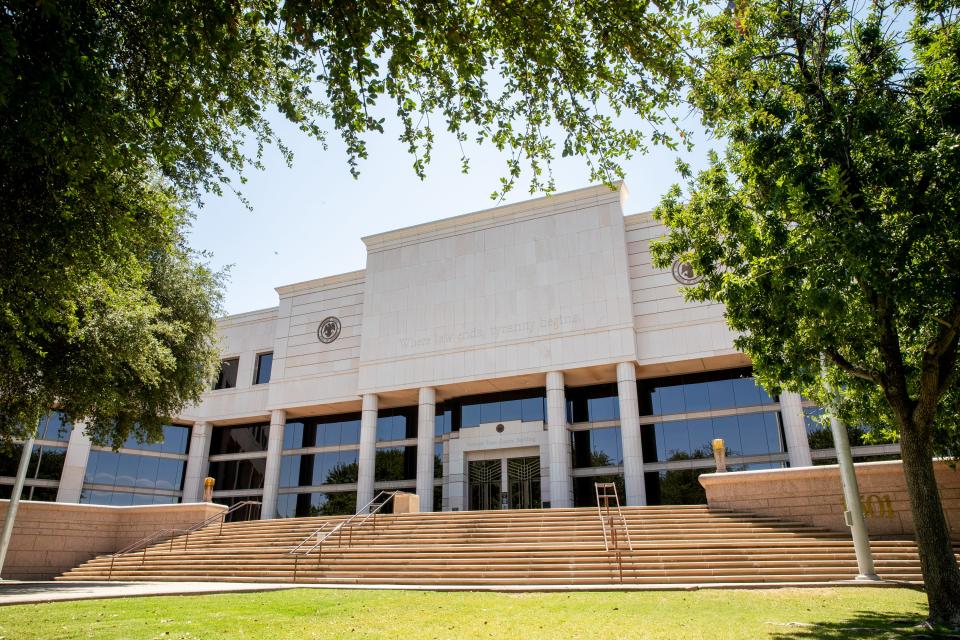Who is on Arizona Supreme Court and how are they selected?
- Oops!Something went wrong.Please try again later.
The Arizona state Supreme Court's duties, as defined in Article 6, Section 6 of the state Arizona Constitution, include hearing appeals of civil and criminal cases from trial courts, hearing automatic appeals when a court sentences a defendant to death, and providing rules of procedure for all lower courts. The state Supreme Court has the right to refuse to review a lower court ruling as well. The high court also reviews misconduct charges against attorneys and regulates State Bar activities.
How many Arizona Supreme Court justices are there?
The state’s highest court, the Arizona Supreme Court, is composed of seven justices who are appointed by the governor. Gov. Doug Ducey signed legislation in 2016 expanding the number of justices from five to seven. The chief justice, selected by their colleagues, serves a term of five years. According to the court’s website, in addition to handling case work, “the Chief Justice oversees the administrative operations of all the courts in Arizona.”
How do Arizona Supreme Court justices get the job?
To fill a vacancy, the governor selects a justice from a list of applicants submitted by the Arizona Commission on Appellate Court Appointments. Supreme Court justices appear on state ballots for retention two years after their initial appointment and every six years thereafter.

Who is on Arizona's Supreme Court?
Chief Justice Robert M. Brutinel was appointed by Gov. Jan Brewer in 2010. Brutinel was selected as chief justice in 2019. Before joining the state supreme court, he was a judge in the Yavapai County Superior Court system and a founder of his own law firm. Brutinel was last retained by voters in 2020.
Vice Chief Justice Ann A. Scott Timmer was appointed by Gov. Jan Brewer in 2012. Timmer was selected as Vice Chief Justice in 2019. Timmer previously served on the Arizona Court of Appeals and worked in private law firms. She was retained by voters in 2022.
Associate Justice James P. Beene was appointed by Gov. Doug Ducey in 2019. Beene, who is half-white and half-Latino, noted that only one Latino justice has served on the Arizona Supreme Court. Beene served on the Arizona Court of Appeals, as well as the Maricopa County Superior Court. He also worked in the Arizona Attorney General’s Office as an assistant attorney general in the Capital Litigation Section. Beene was retained by voters in 2022.
Associate Justice Clint Bolick was appointed by Ducey in 2016 with no previous judicial experience. Bolick was vice president of litigation for the Phoenix-based Goldwater Institute and served on Ducey’s transition team. He worked for Mountain States Legal Foundation, the U.S. Equal Employment Opportunity Commission, the Civil Rights Division of the U.S. Department of Justice and others before landing at Goldwater Institute in 2007. Bolick was last retained by voters in 2018.
Associate Justice Kathryn H. King was appointed by Ducey in 2021. King was a member of the Arizona Board of Regents and a former Ducey aide. King was previously a partner at BurnsBarton PLC, a law firm specializing in labor and employment law. Before that, King served as deputy general counsel for Ducey from 2015 to 2017.
Associate Justice John R. Lopez IV was appointed by Ducey in 2016. Lopez was the first Hispanic to serve on the state Supreme Court. Before that, Lopez worked at the Arizona attorney general's Office as solicitor general, where he prepared legal opinions, administered and enforced state election laws, reviewed constitutional challenges to state laws, and oversaw civil and criminal appeals, including death sentences. He previously worked at the U.S. Attorney's Office in Arizona for more than a decade in various leadership roles. Lopez was last retained by voters in 2020.
Associate Justice William G. Montgomery was appointed by Ducey in 2019 after he had served as the Maricopa County attorney for nearly a decade. His controversial tenure led to an initial rejection by the appellate court appointment commission when he applied for another previously vacant seat on the bench. Montgomery was retained by voters in 2022.
How much money do Arizona's Supreme Court justices make?
As of Jan. 1, 2023, the chief justice’s salary is $212,000 and associate justices earn a salary of $205,000.
What are the qualifications for being appointed to the state Supreme Court?
According to the Arizona Constitution, a justice “shall be a person of good moral character and admitted to the practice of law in and a resident of the state of Arizona for ten years.” Justices are not permitted to practice law while on the high court, and they must abstain from holding any other political office or campaigning for anyone except themselves. Arizona Supreme Court justices are not term-limited, but they must retire by age 70.
Have a news tip? Reach the reporter at jjenkins@arizonarepublic.com or at 812-243-5582. Follow him on X, formerly known as Twitter @JimmyJenkins.Support local journalism. Subscribe to azcentral.com today.
This article originally appeared on Arizona Republic: Who is on Arizona Supreme Court and how are they selected?

